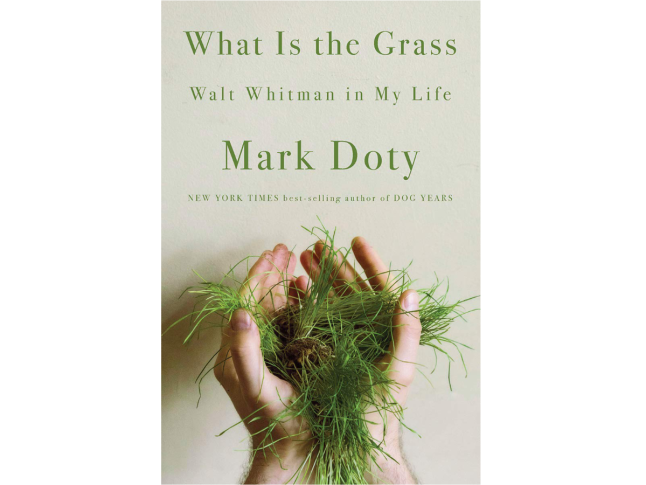At one point in What Is the Grass, Mark Doty asks, “How would you ever understand the places to which I’ve traveled?” Many are the travels in this book: Walt Whitman’s poetic and bodily travels through the cosmos, and Doty’s travels with intimacy.
What Is the Grass combines two of Doty’s many strengths, literary discussion and memoir. Whitman, evangelist of joyful connection and cosmic unity, leads Doty to ponder his own encounters with such things. Through his readings of Leaves of Grass Doty weaves vignettes from and meditations on his life as a man in search of his authentic self. With forgiveness, amusement, and resignation, he takes us through his early marriage, his tortured denials of desire. His arc comprises several relationships, lots of mistakes, and periods of hunger “for the broader range of experience.” He writes that he seeks satisfaction no longer in sex, but rather in closeness and tenderness.
Doty senses Whitman knew all these things, too, that the poet’s affirmative power, his “apprehension that there is no separation between the self and the other,” that in the end “there is really no death,” flows from the propulsive sense of freedom, of release into boundless possibility, that Whitman drew from his discovery and acceptance of himself.
In this light, Doty details five sources of Whitman’s power. The first is an ecstatic apprehension of the unity of existence, primarily through experience of the body. This must have been “a radical experience of reality, magnificent and disruptive.” The second source is the “transformative power of a life of uncharted desire” in all its forms but notably sexual desire. “Uncharted” is meant literally: before Whitman, there had been next to no vocabulary for or explicit exploration of desire outside of the heterosexual.
Doty links these first two sources directly to Whitman’s sexual communion with men, quoting Section 5 of Leaves, a vignette of oral bliss on a summer morning. Doty knows just when to let astonishment at what Whitman achieves run free. How, after all, and why, after all, do lines like these work? What does Whitman do to make them work?
Swiftly arose and spread around me the peace and knowledge that
pass all the argument of the earth,
And I know that the hand of God is the elderhand of my own,
And I know that the spirit of God is the eldest brother of my own,
And that all the men ever born are also my brothers, and women
my sisters and lovers,
And that a kelson of the creation is love,
Whitman’s familiar, irresistible vigor, his bold yet seemingly guileless openness, disposes us to accept a move we might find almost laughable if put another way, as in I had an orgasm and saw God, let’s say. For one thing, the mysticism seems utterly sincere (as, for example, in “On the Beach at Night Alone”). For another, as Doty rightly points out, what makes this passage persuasive is how its focus diminishes:
And limitless are leaves stiff or drooping in the fields,
And brown ants in the little wells beneath them,
And mossy scabs of the worm fence, and heaped stones, and elder
and mullen and pokeweed.
More than just a dying fall, more than a Shakespearean habit of rounding a soliloquy with a homely image, this passage extends its embrace to everything, drooping leaves, ants, moss, weeds. It sounds a note of humility amid ecstasy. Doty tells us of a personal encounter with the limitless, in the Santa Catalina mountains in Arizona, when a moment of connection brought him and nature into mutual acknowledgment.
A third source of Whitman’s power is New York, “the very image of the fullness of being, a capital of the human,” in a purplish phrase, especially New York as a democratic market of bodies and glances. Poetic New York is for Doty gay New York, the Brooklyn of Whitman (where in 1850 “you were who you seemed to be, that moment, that day, in the brisk and delicious air of possibility”), the Manhattan of Frank O’Hara, and the Brooklyn Bridge of Hart Crane. Two last power sources are the rough, absorbent, surging American language; and a profound fascination with death, explored in one of the three high points of this book, his close reading of “Out of the Cradle Endlessly Rocking.”
The other two high points are also close readings, one of the title passage, in which Whitman’s I/You, asked by a child “What is the grass,” makes various guesses while acknowledging he has no idea, cannot say, cannot even tell what it is to exist, to have a form. The head-exploding conclusion is not only (!) that “there really is no death,” but also, in a line that astounds Doty, that “to die is different from what any one supposed, and luckier.” Doty follows with a whole, blissy chapter on that one word.
Whitman at the height dwells with the never-before-said, the never-before-written. Doty’s master stroke is his closing piece on “Brooklyn Bridge,” in which time collapses and the poet looks back from the far future to his readers to come, taking us out of the proper bounds of the sayable. Doty touchingly connects this uncanny moment to a crossroads when he and a beloved realized that, without their knowing, things had changed, and their union had moved into its own future.
Critics have so much invested in poets like Shakespeare and Whitman that big industries arise around declaring them our Shakespeare, our Whitman. In belonging to everyone, of course, these poets escape efforts to own them. For the most part, if not entirely, Doty avoids the ownership move. His focus stays on how Whitman’s poetry braids with his own life. Sure, this Walt Whitman is Mark Doty’s Walt Whitman, but generosity pervades. He’s still anyone’s Walt Whitman.
What Is the Grass is, above all, a really good read. Often joyful, often dark, it is above all charged with the electricity of reading Whitman, learning life from him, being amazed at how his poetry immerses us in both the cosmic glories of the body and the glorious intimacies of the cosmos.
What Is the Grass: Walt Whitman in My Life
By Mark Doty
W.W. Norton
Published on April 14, 2020
288 pages

John Timpane, the former Books Editor and Theater Critic for the Philadelphia Inquirer, is a retired English teacher and journalist living and working in New Jersey. His work has appeared in Sequoia, North of Oxford, Apiary, Painted Bride Quarterly, Schuylkill Valley Journal, Per Contra, Vocabula Review, Truthdig, and elsewhere. His latest book, a chapbook, is Buck in the Piano Room (Philadelphia: Moonstone Press).
